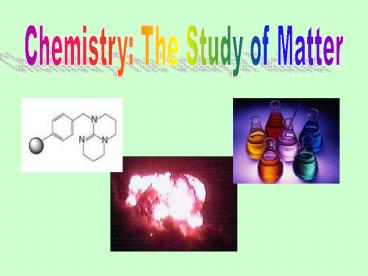Chapter 1 Chemistry: The Study of Matter - PowerPoint PPT Presentation
1 / 19
Title:
Chapter 1 Chemistry: The Study of Matter
Description:
What is Chemistry? The study of the matter, its composition, properties, and the changes it undergoes. Applied Chemistry is the using chemistry to attain certain ... – PowerPoint PPT presentation
Number of Views:250
Avg rating:3.0/5.0
Title: Chapter 1 Chemistry: The Study of Matter
1
Chemistry The Study of Matter
2
What is Chemistry?
- The study of the matter, its composition,
properties, and the changes it undergoes. - Applied Chemistry is the using chemistry to
attain certain goals, in fields like medicine,
agriculture, and manufacturing - Pure chemistry gathers knowledge for knowledge
sake
3
Types of Chemistry
- Analytical Chemistry studies composition of
substances. - Inorganic Chemistry substances without carbon
- Organic Chemistry compounds containing carbon
- Biochemistry- Chemistry of living things
- Physical Chemistry studies behavior of substances
4
Scientific Method
- A way of solving problems or answering questions.
- Starts with observation- noting an recording
facts - Hypothesis- an educated guess as to the cause of
the problem or answer to the question.
5
Scientific Method
- Experiment- designed to test the hypothesis
- There are only two possible answers!
- hypothesis is right
- hypothesis is wrong
- Generates data observations from experiments.
- Modify hypothesis - repeat the cycle
6
- Outcome 1
- Cycle repeats many times.
- The hypothesis gets more and more certain.
- Becomes a theory
- A thoroughly tested model that explains why
things behave a certain way.
Observations
Hypothesis
Experiment
7
- Outcome 2
- Theory can never be proven.
- Useful because they predict behavior
- Help us form mental pictures of processes (models)
Observations
Hypothesis
Experiment
8
- Outcome 3
- Another outcome is that certain behavior is
repeated many times - Scientific Law is developed
- Description of how things behave
- Law - how
- Theory- why
Observations
Hypothesis
Experiment
9
Observations
Hypothesis
Experiment
10
What is Matter?
Matter anything that takes up space (volume)
and has a mass.
11
Chemical vs. Physical Properties
12
Physical Properties
- a property that can be observed and measured
without changing the composition of the
substance. - Examples
- densities, melting points, boiling points,
freezing points, color or smells, luster,
malleability, conductivity, hardness, solubility
13
Chemical Properties
- a property that can only be observed by changing
the composition of the substance which occurs
during a chemical change - (a loss of the identity of the substance - a new
substance is produced). - A good example of chemical properties is the way
elements combine with each other in reactions
14
Physical vs Chemical Changes
- Physical changes - a change that changes
appearances, without changing the composition
the reverse is possible - ex Boiled water is still water.
- Chemical changes - a change where a new form of
matter is form - ex rusting of iron
15
States of Matter
- Solid definite shape, molecules close together,
rigid formation, little molecular movement,
vibration
16
- Liquid indefinite shape, molecules further
apart than solids, more molecular movement - Pressure and temperature influence it.
17
- Gas indefinite shape and formation.
- Molecules are far apart.
- The most molecular movement, constant motion
- Affected by temperature and pressure
18
States of Matter
Definite Volume?
Definite Shape?
Temperature increase
Compressible?
Small Expansion
Solid
YES
YES
NO
Small Expansion
Liquid
NO
NO
YES
Large Expansion
Gas
NO
NO
YES
19
Liquid
Gas
Solid
Sublimation































